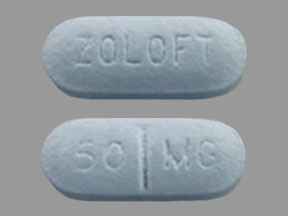Zoloft and Alcohol/Food Interactions
There is 1 alcohol/food/lifestyle interaction with Zoloft (sertraline).
Sertraline Food
Moderate Food Interaction
Using sertraline together with alcohol may increase side effects such as dizziness, drowsiness, confusion, and difficulty concentrating. Some people may also experience impairment in thinking, judgment, and motor coordination. You should avoid or limit the use of alcohol while being treated with sertraline. In addition, taking sertraline with grapefruit or grapefruit juice is not recommended, as it has been reported that grapefruit juice can increase the blood levels of the medication, which may lead to more side effects. Talk to your doctor or pharmacist if you have questions on how to take this or other medications you are prescribed. Do not use more than the recommended dose of sertraline, and avoid activities requiring mental alertness such as driving or operating hazardous machinery until you know how the medication affects you. It is important to tell your doctor about all other medications you use, including vitamins and herbs. Do not stop using any medication without first talking to your doctor.
Switch to professional interaction data
Zoloft drug interactions
There are 673 drug interactions with Zoloft (sertraline).
Zoloft disease interactions
There are 10 disease interactions with Zoloft (sertraline) which include:
- depression
- hyponatremia
- glaucoma
- liver disease
- mania
- platelet function
- seizure disorders
- SIADH
- renal dysfunction
- weight loss
More about Zoloft (sertraline)
- Zoloft consumer information
- Check interactions
- Compare alternatives
- Pricing & coupons
- Reviews (1,972)
- Drug images
- Side effects
- Dosage information
- Patient tips
- During pregnancy
- Generic availability
- Support group
- Drug class: selective serotonin reuptake inhibitors
- Breastfeeding
- En español
Related treatment guides
Drug Interaction Classification
| Highly clinically significant. Avoid combinations; the risk of the interaction outweighs the benefit. | |
| Moderately clinically significant. Usually avoid combinations; use it only under special circumstances. | |
| Minimally clinically significant. Minimize risk; assess risk and consider an alternative drug, take steps to circumvent the interaction risk and/or institute a monitoring plan. | |
| No interaction information available. |
Further information
Always consult your healthcare provider to ensure the information displayed on this page applies to your personal circumstances.


